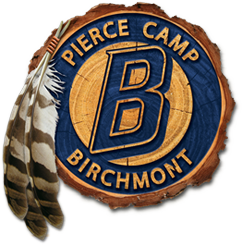Week 2 of Summer Fun!
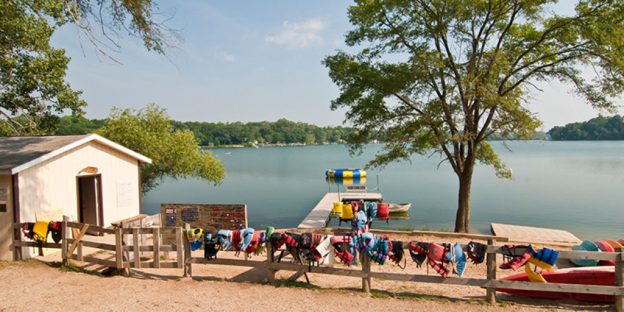
Lessons From Camp
Free from school-year demands, summer camps are a key venue for social-emotional learning
By Leah Shafer, on July 1, 2016 11:23am
Summer camp: For so many kids, it signifies carefree days of swimming, playing sports, singing songs, and reveling in freedom from the demands of the school year. Camp means no homework, no studying, and no teachers.
But significant learning is still taking place at summer camp — even if the campers don’t necessarily realize it.
Summer Learning (Without the Books)
All those classic camp dynamics — being away from home and parents, making new friends, being part of a team, and trying new things — are building blocks to crucial social-emotional skills.
Social-emotional learning (SEL) can encompass a variety of practices, but most experts agree that a child with high SEL skills is successful in five core areas: self-awareness, self-management, social awareness, relationship skills, and responsible decision making. These skills are increasingly understood to be central to success in school and in professional life beyond, but schools don’t always have the time or capacities to teach them explicitly. Obligations to complete curriculum and boost student achievement often make it difficult for teachers to prioritize community building, goal-setting, or problem solving in their classrooms.
Unconnected to the commitments of the school day, summer camps (particularly overnight camps) can dive head-first into social-emotional learning — and many do. These opportunities are especially importance for low-income students, many of whom already have fewer opportunities to gain these skills outside of school.
A 2005 study of 80 camps by the American Camp Association (ACA) found significant growth in children’s social-emotional skills after a session of summer camp. Camp staff, parents, and children reported increases in children’s self-esteem, independence, leadership, friendship skills, social comfort, and values and decision-making skills, from the beginning to the end of a session.
What a Good Camp Experience Looks Like
It’s not just the new environment and flexible schedule that builds kids’ social-emotional skills. Many camps have an intentional focus on social-emotional learning. YMCA camps, for instance, explicitly discuss their four values — honest, caring, respect, and responsibility — constantly, through songs, skits, and rallies. And most camps train staff to coach kids on becoming more independent, socially aware, and reflective.
In particular, camps foster relationship skills and social awareness by:
- Introducing children to an entirely new group of peers. Camp may be the first time children have spent substantial time with people whose background — home, race, or religion — is different from their own.
- Setting up opportunities for children to find their own friends. According to education researcher and longtime camp counselor and director Claire Gogolen, counselors often begin a session by leading icebreakers and regularly sorting a cabin group into different pairs. These activities give campers explicit opportunities to get to know each other, allowing them to figure out who they want to become better friends with.
- Creating a space where silliness is accepted, and bullying is not. Without the need to plunge into academic content, camps have time to use the beginning of a session to prioritize group norms, says learning specialist and former camp counselor and director Ari Fleisher. Counselors can make it very clear that bullying and teasing are not acceptable. At the same time, camps can encourage songs, jokes, and general silliness that allow campers to relax and be themselves.
- Taking a break from technology. Many overnight camps restrict or prohibit phones and computers. For many campers, this means it’s the first time they’ve made friends without the help of Instagram or Snapchat, and they learn how to navigate social cues to build and maintain friendships in “real life.”
- Modeling teamwork and sportsmanship. During staff training, many camps stress the importance of adults demonstrating cooperation and friendship to their campers. When campers are surrounded by positive role models — particularly role models closer to their own age than teachers are — they learn how to get along with peers who may be different from them.
Camps also nurture self-awareness, self-management, and responsible decision making by:
- Requiring children to solve day-to-day problems on their own. With limited contact with parents, campers have to learn how to manage their own conflicts, whether it’s a disagreement with a bunkmate or not getting their first-choice activity.
- Presenting activities that are new to everyone. Counselors often purposefully lead games and activities that none of their campers have tried before, says afterschool specialist and former camp counselor Nicky DeCesare. Without the fear that some peers will already have a leg-up on lava tag or basket making, children may be more likely to decide to try new things.
- Offering kids the chance to set and accomplish daily goals. The sheer amount of new activities makes it possible for kids to continually set and achieve goals, deepening their understanding of personal limits. One day a camper may be set on reaching the top of the climbing wall, and the next she may be determined to collaborate with her group to create a new song.
- Helping children uncover new skills. Kids who are usually immersed in academics may become aware of new skills that they didn’t know they had. For children who struggle in school, these opportunities can increase self-confidence.
- Providing time for reflection. Many camps begin or end the day with reflection activities, in which campers can think about the challenges they’ve faced, how they’ve grown, and what they’re excited for. These moments, rare in a typical school day, can develop self-awareness and mindfulness for all kids.
Additional Resources
Read the full American Camp Association report.
Birchmont’s 65th Summer Begins…
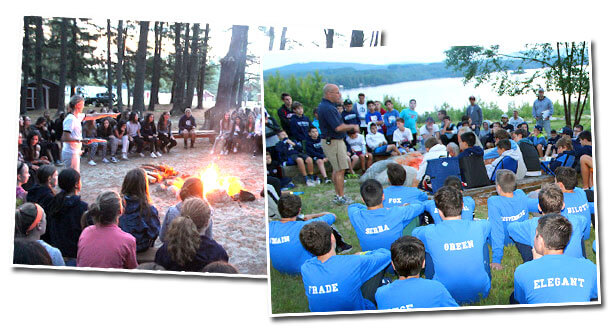
We Are All Here!!
It’s July!! The camp is in full swing with children settling into cabins with names as strange now as they will be beloved soon… Abenaki, Kancamagus, Tecumseh, Devil’s Den.
Our bunks at Birchmont are named for great chiefs of Native American tribes that occupied these lands, and mighty rivers and mountains in this area of New Hampshire where we make our summer home. Its true enough our camp motto comes to life this week “There are no strangers within, only friends waiting to be met” and our campers are making friends and sharing smiles in all areas of camp life.
It’s also true what they say … A picture is with a thousand words and we will by summers end have a thousand pictures to share with you of your children, our campers, and we couldn’t be more excited as our 65th summer unfolds.
The weather has been picture perfect too, sunny skies, clear nights with just enough rain to sprinkle our ball fields and flowers. Our youngest campers have gotten out tubing on the lake at sunset, our 11 and under boys tennis took 2nd place at a regional tournament, and our girls are playing an inter-camp tennis competition today. Over 200 children have passed their laps, and we are sailing, kayaking, paddle boarding with friends and counselors. We have had our opening Firelight ceremonies under starry skies. The boys gathered at the huge stone fire pit overlooking the lake, and the girls Firelight was held in our Candlelight fire pit where long standing traditions are held, like Song Fest for Color War and of course our closing Candlelight. At the boys Firelight some staff new and old asked each camper to make the most of their time at camp, to go outside their comfort zone and try something different and to make a new friend. At the girls’ ceremony, every camper and counselor in camp were held together by one symbolic piece of yarn which was cut into bracelets as a remembrance of a first night together where we know we can become whoever we would like to at camp. If you’re the “arty” one at home, try some new sports, if you’re the ” sporty one, make a clay pot, if you’re the “little sister” learn to lead, if you are the “quiet one” reach out towards friendships. Camp is a beautiful place for invention, for goal making, turn taking, a place where all of us can be our best selves, and you know what… It doesn’t feel like work, or school, it just feels FUN!!
We have so much to look forward to as we go into this holiday weekend. We hope you enjoy your 4th of July, we have races, and ice cream sundaes, fireworks and more…
Going to Sleepaway Camp As A Kid Might Prepare You Better for College
This recent article from NBC News describes how attending summer camp can help your child ease into college campus life with a little more ease. The benefits of summer camp last a lifetime!
Going to Sleepaway Camp As A Kid Might Prepare You Better for College
by Allison Slater Tate, NBC News
Here’s a more fun way to prepare for college than studying: Go to overnight camp.
Summer camp may not help you ace your college calculus class, but experts say being away from home when you’re younger can help you ease into campus life.
“While we don’t track students who have participated in an overnight camp experience, I can comfortably speculate that those who have are more apt to apply the tools they learned there in resolving roommate conflicts, problem-solving in small groups, and learning to live with people from different backgrounds,” Kenyon College vice president for student affairs Meredith Harper Bonham told NBC News.
While some students struggle when they leave home for the first time, veterans of overnight camp arrive on campus armed with some important lessons in communal living.
“Many of our students have never had to share a room, or even a bathroom, with a sibling,” Bonham said, adding that some students have grown up in “highly segregated areas with respect to race, ethnicity and socioeconomic class.”
Overnight camp forces the type of constant interaction, negotiation and direct communication that students will face in the communal, diverse environment of a residential college,” she added.
“ON TOP OF FORGING FRIENDSHIPS FOR A LIFETIME, CAMP TAUGHT ME HOW TO BE AWAY FROM MY PARENTS, INTERACT WITH COMPLETE STRANGERS, AND BECOME INDEPENDENT.”
Benjamin Eidelberg, 22, felt his camp experience came in handy when he got his undergraduate degree. He spent summers at Camp Cobbossee in Monmouth, Maine, starting at age 10.
“Camp was a great way to prepare me for college and leaving home,” Eidelberg, who got his Bachelor’s from the University of Maryland and is now getting a Master’s there, told NBC News. “On top of forging friendships for a lifetime, camp taught me how to be away from my parents, interact with complete strangers, and become independent.”
He drew parallels between the first day of college, when he didn’t know anyone, and the first day of camp, where the only campers he knew were his brother and two family friends.
“Like in college, I was forced to meet and socialize with strangers and ultimately develop my group of friends,” he said.
Eidelberg also found camp fertile ground for developing confidence and a new perspective.
“Camp served as an escape from life at home, whether it was school or just Pikesville [Maryland] in general,” he said. “It was a place, similar to college, that was fresh and where others did not have strong predispositions, at least prior to my first couple of summers.”
Kenyon College’s Bonham said she sees the benefits of summer camp for her own children too: whether it’s sharing care packages with their bunkmates or getting out of their comfort zones and trying new activities.
“While I like to think they learned all of these qualities as toddlers, receiving the additional reinforcement as pre-teens and teenagers can only help as they develop into humane, socially conscious adults,” she said.
Though summer camp experiences don’t often make it onto college applications, college admissions counselor Sara Harberson of Admissions Revolution believes they could still serve applicants well.
“The memories and lessons students have from summer camp will imbue them with a genuineness and adaptability which may come through in unpredictable ways in their essays, letters of recommendation, and interviews,” Harberson said. “Most importantly, their approach to the college process and their choices about how to spend their remaining summers are usually quite thoughtful, because they have a taste of what it means to be happy with their surroundings. That might make going to camp as a younger child priceless in the end.”
Safe Waterfront for Lifeguarding Staff & Campers
This recent article from Camp Business illustrates how seriously we take waterfront safety here at Camp Birchmont. Our number one priority all summer long is to keep our campers safe and having fun.
Smooth Sailing At The Beach
Creating a safe waterfront for lifeguarding staff and campers
by Robert Attonito
It’s another spectacular New Hampshire afternoon at Camp Birchmont as I sit alongside Lake Wentworth, enjoying a moment of quiet. The lake is calm and crystal-clear, a young bald eagle floats high overhead, and a gentle breeze is the only thing to be heard. In the distance, the tranquility is broken by the sound of happy children rushing to their afternoon “free swim” period at what we simply refer to as “the beach.”
As waterfront director, my responsibility is to balance fun with safety, to allow just enough spirited play while maintaining a watchful eye in preventing incidents and accidents. At Birchmont and especially at the beach, creating a safe and secure environment for campers is still the top priority, while allowing them to learn new skills and have fun frolicking in what can be described as the perfect camp lake.
Start With Staff Members
To start the summer, the camp’s lifeguard orientation begins before all other staff orientations. Prior to arriving, all lifeguards receive emails that contain lifeguard manuals, a staff handbook, and other articles on camp and boat safety. All waterfront staff must study for and take the challenging New Hampshire Commercial Boat Licensing exam in accord with state requirements. From the time they are screened and eventually hired, all lifeguards are scrutinized for experience, certifications, and general knowledge as it pertains to both the camp experience and waterfront acumen. Creating a great espirit de corps among guards is essential in creating a high staff return rate among waterfront staff. During the extensive orientation, lifeguards are taught the skills they need to master before the children arrive two weeks later. Although most come with proper certifications, the entire waterfront staff benefits from a thorough review. The orientation time is spent on rescue skills, CPR/AED, and first aid. An emphasis on boating safety with the inherent dangers, as well as all waterfront policies and logistics, are covered to ensure an effective response to any incident. Our emergency-action plan is repeated often to ensure an immediate reaction. Skills are taught and reinforced throughout the summer and reviewed weekly by the waterfront directors, based on observations or incidents to guarantee there is no deterioration of skills and to combat complacency. Waterfront staff members are required to swim laps daily to build endurance and help fight fatigue. Once the members are ready and the kids arrive, we have a tradition of administering our own high-level swim test for each camper, prior to giving them full access to the lake.
Swim Tests
For us, morning instructional swim is not optional until campers have completed 7th grade, and/or have completed a vigorous deep-water swim test. Morning swim is comprised of three periods of American Red Cross swim instruction, which includes lessons for a wide range of ability levels, from novice swimmers to those pursuing a highly sought-after Lifeguard Training Certificate at age 15.
During the afternoon swim, campers are offered a wide array of choices, including a free swim, kayaking, sailing, skiing, paddle boarding, floating iceberg, and trampoline with a rope swing, and more! Having established a safe environment provides campers an envelope of security that promotes a love for the “beach.” Swim time remains as popular as ever, since the Pierce Family established the camp back in 1951. In fact, parents and campers looking for a traditional, big lake experience are drawn to Birchmont and beautiful Lake Wentworth! While we’d love to share all of the success stories of kids learning to ski, sail, wakeboard, swim, pass “LIT”, etc., this article’s focus is on some of the protocols and policies for safety we have adopted over the years.
What we do at the beach may not be for everyone, but we continually refine the program so it works well for today’s campers and adheres to our camp traditions. The hope is that readers might obtain an idea or reinforce one of their own practices so that all camps provide secure waterfronts.
Lake Wentworth is 13 miles in circumference, and at 3,097 acres, is the seventh-largest lake located entirely in New Hampshire. Campers need to be confident swimmers, even with the use of life preservers, which are required once outside the roped-in swim area. To that end, we adhere to a deep-water test that consists of a lap requirement (approximately a 200-yard continuous swim), which campers must pass in order to gain access to the lake at large for boating (sailing, canoeing, paddle boarding, kayaking), waterskiing, wake boarding, and/or tubing. Not only is the policy safer in the long run, but it becomes a clear esteem-booster as campers are always recognized for their efforts by staff and peers. Once children do pass, a myriad of activities are open to them, regardless of age. In fact, we encourage children to try every waterfront activity that is offered as an integral part of camp life.
Keep Staff On Their Toes
As director, my major focus is on constantly watching over my staff of 18+ members to ensure they maintain the safest possible waterfront protocols that include the “five-minute scan” developed at Penn State University and the RID factor, recognized by the American Red Cross. Additionally, we use the buddy system for all campers and staff, who also must pass a required staff swim test. In addition to myself as the director, the staff hierarchy at the waterfront includes my longtime assistant director, Polly Goldman (W.S.I.), followed by three team captains who are senior lifeguards, and who supervise a team of six other guards. Every afternoon (consisting of three activity periods), each team rotates between lifeguarding, sailing, and waterskiing, keeping individuals fresh, and yet working as a team that is familiar with one another. Instilling a true family atmosphere that includes the directors and the entire staff creates a vested interest in not letting each other down. We make sure staff members know that “bad things can and do happen to everyone,” regardless of the camp or program. In that regard, a healthy sense of fear help keep lifeguards on point for the entire summer.
One final distinction is that the beach is always closed to visitors, campers, staff members, and even owner/directors when lifeguards are not on duty.
Explore And Excel
We want all campers to have fun, and we encourage them to truly enjoy the beach and all of the waterfront activities, not only the ones within their comfort zone. Having a large, well-trained, and competent lifeguarding staff is essential to maintaining that safe environment for children to explore and excel!
Ultimately, all of these efforts and protocols lead to a safe and rewarding waterfront experience, and one that for 65 summers has left campers running back to the beach for more!
Robert Attonito is a retired N.Y. teacher, coach, wrestling official, and fireman from Deer Park, N.Y. He is an AMT, a WSI since 1964, and member of the National Wrestling Hall of Fame. “Bobby” has been at camp since 1954 as a young camper, and is now considered a Birchmont living legend.
Candlelight at Pierce Camp Birchmont
Just about everyone who has ever spent a summer at Birchmont can recall their “Candlelight” night(s). Candlelight is a very special tradition on the last night of the summer which mixes high running camper and staff emotions with the looming camp departure to create a ceremony wrought with reflection, gratitude and usually a few laughs for all. At Candlelight all campers and staff gather in our campfire area, sitting amongst their group and staff mates, staring at the fire and listening to first one camper – and then one staff member after another give their thanks for the summer past. Unlike our opening night “Firelight” ceremonies which split the girls and the boys to different fire pits and to lay out goals for their summer ahead, Candlelight is coed and serves as a great way to put a cap on another wonderful camp season as a coed community.
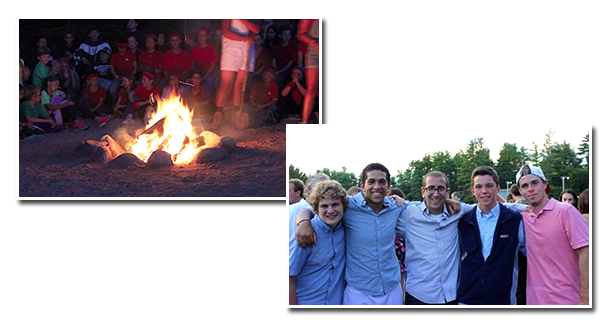
Candlelight starts with Greg and Laura standing in front of a large campfire just after nightfall, under the beautiful, tall pines up behind Notches and surrounded in a large circle by their entire 2015 camp “extended family”.As they begin and light the first candles of the night, there is an almost surreal silence among the 400 or so people in attendance. Many are deep in reflection, somber at the thought that camp is basically over, knowing their departure is imminent the next morning and perhaps feeling at this point like close friends about to go their separate ways until next year.
Greg and Laura share thoughts and reflections on the summer gone by and set a mood for the rest of the evening, one that is thankful, uplifting and filled with brief stories that typically bring a laugh from the entire gathering. Once done with their comments, Greg and Laura introduce the Pioneer “B” winner along with their group leader, each of whom get to share a few words and thoughts from their summer at Birchmont in front of fire and for all to hear.
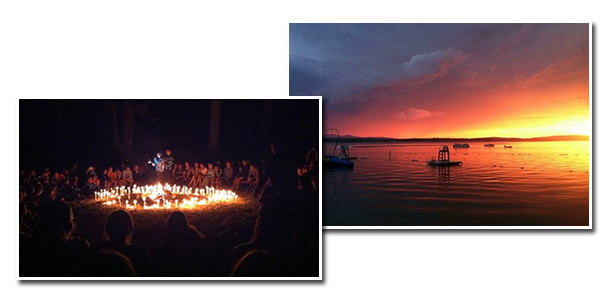
One by one, starting with the youngest group and all the way up through the “Super Senior” groups, every B winner and group leader is introduced and share their comments. At the end of each speech, that entire group of campers and their staff are invited around the fire together to light their own individual candles. The fire is surrounded by 2-3 inches of sand all the way around and candles, once lit, are pushed into the sand to create a stunning visual image that is both mesmerizing and stunning to see.
Eventually, every supervisor, all campers and all staff will light a candle that is then stuck into the sand with all the others. The result is a pretty spectacular circle of burning candles surrounding a larger bon fire. The image is a truly memorable one and for many it serves as a metaphor for how 400 individuals have, over the course of just one or two months come together to make and become a part of something much bigger than themselves… part of a very large family at camp they are likely to remember forever and a part of a very small community of friends they will always be welcome back to.
As the temperature drops, candles fade and the last logs burn down, the Super Seniors surround the fire and stand arm in arm reflecting on their camp years, flanked by Greg and Laura Pierce. For some, the idea of returning to the place they love as a staff member in a few years is comforting. For others, this marks the end of a very special era that can’t be replicated and some tears mix in with their collective laughter. Happy or sad, they all share the common bond of having made so many lifelong “camp friends” and countless memories at Birchmont.
Its very true what they say, summer at camp and time, in general, move way too fast! We will miss you Supers! And for everyone else, we hope to see you NEXT SUMMER for our 65th season! We hope everyone is enjoying time home with their families and nobody is experiencing “camp sickness”.
“Don’t cry because it’s over, but smile because it happened.”
-Dr Seuss
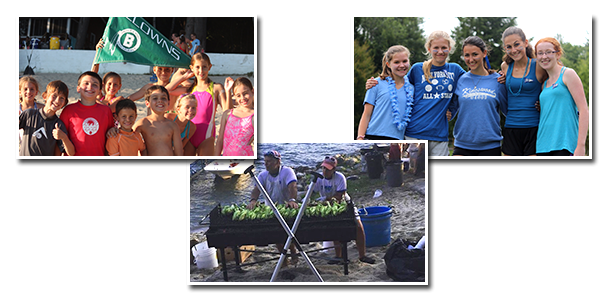
Birchmont Presents Matilda The Musical
We commend everyone who took the stage to be part of what was arguably the best camp musical production in years! The talent that was assembled for Roald Dahl’s Broadway tale of a brilliant child who rebels against her oppressive school and awful parents, was by any theater critic’s standards, fantastic. The chorus ensemble from our very youngest campers to our oldest delivered the fiercest, most rousing musical numbers with tight and terrific choreography. “When I Grow up” and “Revolting Children” were stand out performances fully deserving of the ovations they received. And best of all, the kids on stage were having a ball.
Jessie R as Matilda and Renee M as Miss Trunchbull were the night’s brightest stars.
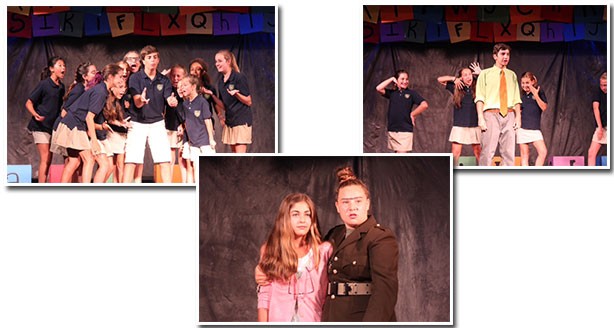
Jessie amazed everyone with her great vocal range and well timed delivery of clever lyrics with fine musicality. Jessie’s energy never wavered and she made the audience love Matilda with her first song “Naughty”.
Miss Trunchbull played with great gusto by Renee M. had the audience rooting against her character from the get go, and her two solos, “The Hammer” and “Smell of Rebellion” were actually scary and hilarious at the same time. Miss Honey, played sweetly by the very musical Annika P. was the perfect foil as she delivered her haunting songs ” My House” and “Pathetic”. The set design and costuming added great production value. The brightly painted wood blocks made in woodshop, scattered on stage were also echoed in the alphabet tiles which encircled the curtain and made for a perfect classroom scene. Campers working the spot light managed to catch all the soloists, and made good use of the colored filters to enhance the moods on stage. All the actors hit their marks, and few lines were missed so the script made sense, and set up the songs perfectly.
Super Senior Raquel G served as the dance captain and I do not think it is over estimating her talent, to suggest, with future training and experience she could become a choreographer of some note; she’s simply a natural. Our director, Steve Vieira and musical director, Cherry Yang did a wonderful job teaching and coordinating all facets of the production.
The kids on stage were having a great time, and that’s what camp theater should be.
The full cast party consisted of hot pizza, cold sodas and a special cake baked for the occasion. But probably the sweetest reward was to come later as so many campers were congratulated and praised by their friends and counselors that night and following day.
Personally, I missed “Matilda” on Broadway, but I don’t think I could have enjoyed this show more if I had seen it in orchestra seats in Times Square.
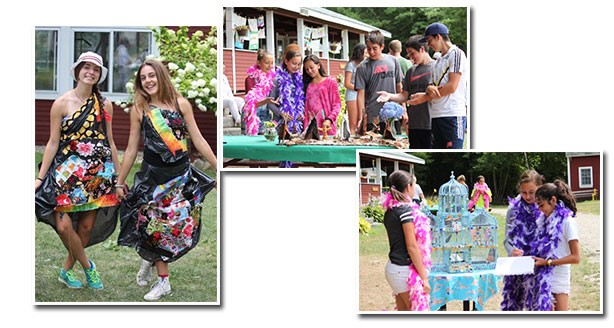
A few nights before the play, we had another lovely arts event on campus. Each summer we host an art gallery evening up at Notches where campers display their art works for the camp to see. There’s jazz playing, faux champagne served (ginger ale with raspberries and blueberries) and petit fours baked in our kitchen and served on trays, adding a little elegance and sophistication to the affair. This has been a transporting evening with campers talking about art, how they make it, what they envisioned, how long it took to create…But alas, this is not a gallery in an arty city loft, and just as we got started a summer storm blew in bringing thunder, wind and big black rain clouds, in minutes, it began pouring. We all scrambled to save the art and get under cover vowing to re-schedule. We were able to make that happen, but there were precious few evenings left with Color War breaking, and Water Carnival nights on the beach, so we do what campers do, we do not whine, we do not cancel, we re-group, re-adjust, and do what we aimed to do in the first place. We pulled off the art show on a sunny rest hour afternoon, and it was still wonderful. There were paintings, sculptures, wood projects, glazed pots and bowls, and mixed media pieces including a rusty bird cage centerpiece lined with mosaic tiles and stones that was transformed, inspired by a photo of the Taj Mahal. A few Upper Seniors designed and wore “disposable dresses” for the occasion. Creativity ran amok, just the way we like it. Kids wore feather boas and fake mustaches for the occasion, too cute for words.
We are now full steam ahead into Color War, and the excitement builds every day.
Photographs now should reflect the primary colors of our four teams, but we don’t know if photographs can really capture the fun, joy, and never ending spirit of this weeks activities.
Our colors are true blue for Birchmont, no matter which color wins.
Good Article Sheds Light on Teachable Moments For Campers
We like this recent article from Psychology Today which resonates with why the summer camp experience is such a powerful one, and how it offers memorable teachable moments, referred to here as “disruptive moments” in the brain.
Anyone who has been to overnight camp can probably relate to the author’s discovery and insights into the hard-wiring of the learning experience in the minds of children. I wasn’t a psych major in college, but this makes sense to me. Enjoy.
Summer Camp and Disruptive Moments
Camps have a powerful impact on the children they serve. He is a reason why.
By Steve Baskin on Jul 26, 2015 in S’mores and More
For the past 23 years, I have worked as a summer camp professional. As a child, camp was one of the definitive developmental experiences of my life. As a camp director, I have seen a short 2 or 3-week sessions become transformative to a child. When I applied to graduate school, I wrote about my camp experiences as a seminal experience.
If you know someone who attended camp, you probably wonder what the fuss is all about. How could a short experience be so much more meaningful than 9 months of school? You may wonder if your friend is a little delusional. It does not make sense that 3 weeks for 5 summers could be as powerful as they insist it is.
[Note: if you went to camp, you are likely the person sharing these stories and confusing your friends.]
This article is an effort to explain partially why camp is so impactful.
Put simply, camp helps people improve their personal narrative in a remarkably efficient way.
It starts with our brain. We are wired to become very attentive to new and unusual experiences. Do you remember your first kiss? How about the first time you met your college roommate? I suspect you remember both in great detail. But do you remember your 20th kiss with the same person or your 15th conversation with your roommate? I suspect not.
This is because familiar experiences are not threatening. We know we will survive them because we have already survived them. But when an entirely new experience occurs, our brain detects a potential threat and lights up and becomes highly focused. We notice and remember more. Our brain changes from brick-like to sponge-like.
When we are in this “sponge-state”, we will absorb and retain our memories, feelings and ideas. The brick is slow to learn. The sponge is a learning machine.
I call these new and unfamiliar experiences “disruptive moments”.
One of the reasons camp is powerful is because it is full of these new and unique “disruptive moments”:
- The first time away from home,
- Meeting an entirely new cabin of friends and counselors,
- Ascending a 40 foot climbing wall (especially if you have a fear of heights),
- Seeing a sky full of stars for the first time,
- Performing in front of people at a talent show
- Camp has another cool advantage – camp professionals know when these disruptive moments are happening. They know when a child’s mind is like a sponge. This knowledge creates an opportunity.
Camp counselors and directors can provide a “powerful message” that combines with these “disruptive moments”.
When a camper’s mind is like a sponge, counselors can make sure that the sponge is absorbing lessons that will help make him/her more capable, confident, competent and successful.
Let me share an example of combining “disruptive moments” with “powerful messages”. Imagine a 9 year-old girl with a strong fear of heights approaching a Climbing Wall with great trepidation. After much encouragement from her counselor, she chooses to climb, setting as her goal the half-way point. She ascends 25% and becomes nervous, but the cheers of her friends and counselors encouragers her to go halfway. She is incredibly nervous and is ready to come down when her counselor provides a loving challenge, “can you go one more step?” The girl climbs “one more step” about 5 times before deciding she is done. After climbing 75% of the wall, she rappels down and arrives on the ground. She is shaking and proud.
Clearly, she just had a “disruptive moment” and her brain is like a sponge.
At this point, the counselor can deliver a message that will have maximum impact. I will give three different messages – one common, one horrific and one incredibly powerful.
The common message would be happy and simple, “I am so proud of you! Great job. Give me a hug.” This is what most counselors will say and the camper will remember the climb and the love/acceptance that followed it. Not bad.
A horrific response would be different. [Note: I cannot imagine anyone saying the following, but imagine the impact if she did.] “Wow, I have been here all day long and you are the only person who has failed to reach the top of the wall.” Words of disappointment like this might make the child believe that she is weaker or less capable than her fellow campers. This internal narrative would likely stick with her at camp and back home.
Imagine instead the following powerful and validating comment that I actually heard a counselor use in this situation. “Wow! I have been here for two days and you are the ONLY camper who went 50% above her goal! You know, many people never reach their goals. Those who do reach their goals usually stop. I think you are one of those rare people who can face a fear and go beyond your goals. I cannot wait to see what you will be like when you grow up!’
This young girl practically floated around camp for the next week. She now saw herself differently, not as a girl defined by a fear but a determined individual who can overcome challenges.
By combining enough “disruptive moments” with these “powerful messages”, a quality camp experience can change a camper’s personal narrative. Every one of us has a personal narrative that helps us interpret the world. Some people have powerful and effective narratives:
- Hard work pays off
- I am likable
- If you treat people well, they will treat you well
- I am lucky
- I can learn new things
- Inside of every problem is an opportunity
Others have dysfunctional narratives:
- You cannot trust other people
- No one likes me
- Nothing good ever happens to me
- I am not good at stuff
- The world is full of problems that I cannot do anything about
- You have to look out for yourself, no one else will
Once we have a narrative, we tend to hold onto it. It takes an unusual experience to change these closely held beliefs. Typically, we do not have many such experiences.
But such experiences are almost common at camp. The “disruptive moments” happen at predictable times and they are naturally mated to with the right “messages”.
This combination enables camp to create an impact that is disproportional to the time spent there, creating new narratives and strong memories that continue for years.
“Watch Carefully the Magic That Occurs, When You Give A Child Just Enough Comfort To Be Themselves” -Atticus
It has been so wonderful watching our campers come into their own this week. The collective awareness that time at camp is passing quickly now is palpable. We have gotten a lot done these past few days.
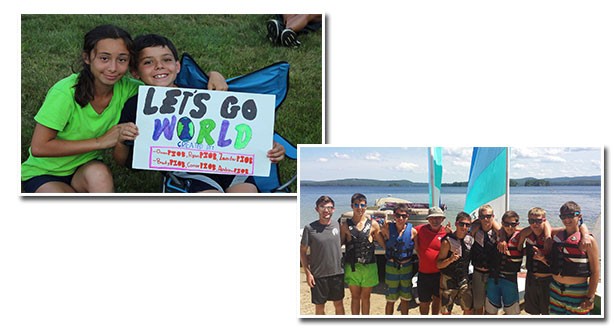
We entered 8 of our Upper Senior campers in the Lake Wentworth Association Sailing Regatta and took second place. It was a gorgeous day for sailing with friends! To come so close to a first place finish in a tournament of people who have grown up on this lake, was a good testament to the “know how” of our campers, and the strength of our waterfront program. Our beginning water ski club has had great success getting kids up and around the lake in the evening activity when the lake is like glass just before sunset. On land, campers who learned to ride bikes here without the fear of traffic, or falling on pavement have gone “off road” on the Rail Trail to town…many steps taken on the road to self-discovery.
Other fun happenings at camp which included our staff World Cup Soccer Tournament where bravely, perhaps insanely, England took on the rest of the world, and lost when the American soccer counselor, Nick, put in 2 goals to bring the final score 3 to 1. It was a really spirited night as campers wrapped themselves in flags from different countries and screamed out to their favorite counselors on the field. So many counselors got into the act and the sportsmanship, athleticism and antics made for a great spectator event.
Greg Howes former collegiate player at Springfield College had a solid game, and kept up with counselors half his age which was exciting for our supervisors to watch as well.
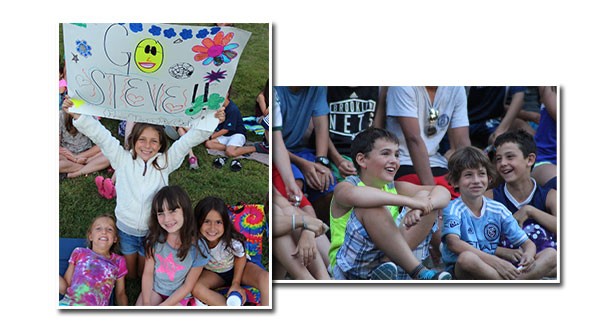
The soccer game was followed after dark by an outdoor movie on campus for our younger campers who watched “Big Hero Six” an awesome animated feature with an uplifting message about friendship and brotherhood tucked in.
The following evening after our Explorer Girls tucked in for the night, Greg and I rallied the girls out of their bunks to see the beautiful sight of the Blue Moon rising up just over Notches. We all gathered in the middle of the field and stared at a sight that would not be seen again till 2018! I loved hearing the kids giggle and gasp and ask why they call it a Blue Moon, its big and bright but not blue. We explained the phrase “once in a blue moon” and listened to kids say they never get to see a sight like this in their pajamas, and best of all, with their friends. Some special moments at camp happen often, others, well, once in a blue moon.
Speaking of things that are blue at camp, the native high blueberry bushes at the Garden Club, are bursting with fruit, and are picked and eaten by whoever wants them. Naturally, our organic garden does not include spray so everything is edible and available to harvest.
Sunday was a different kind of a day, but jam packed, starting with our late reveille, some Breakfast Rides on horseback with Martine, and our beloved Bagel Sunday for the whole camp which included Bagels and lox and all the fixin’s. One of our Explorer girls who came to Birchmont all the way from China had seen and tasted her first bagel, and her American camp friends tried to answer why it has a hole in it? Is there really an official answer to this question?!
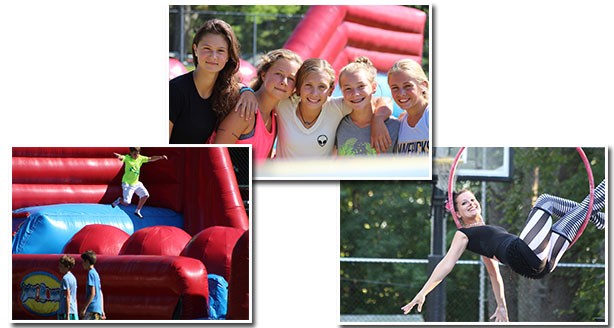
Sunday was also our Midsummer Surprise which had been rained out after Visiting Day. The camp had a great time playing on giant inflatables and games of skill, with an outstanding DJ spinning tunes. That evening the entertainment continued with an outdoor Cirque du Soleil type troupe which performed exciting arial stunts to a local live band giving the feel of a private concert and gymnastics show rolled into one. To end the night, the entire camp rocked The Lodge with our first DJ social of the 2nd session!
Next week we have some tennis and soccer competitions and some of our natural highlight trips including The Polar Caves, The Flume and camp-out, and a 3 day trip to Boston. We close the week with our camper musical production of Mathilda on Friday and the whole camp is psyched as we begin perhaps the best week of the summer on Saturday as we break our 64th Color War. Looking forward to a great week ahead!
 Camp Birchmont
Camp Birchmont
